Pharmacotherapies for sleep disturbances in dementia
- PMID: 33189083
- PMCID: PMC8094738
- DOI: 10.1002/14651858.CD009178.pub4
Pharmacotherapies for sleep disturbances in dementia
Abstract
Background: Sleep disturbances, including reduced nocturnal sleep time, sleep fragmentation, nocturnal wandering, and daytime sleepiness are common clinical problems in dementia, and are associated with significant carer distress, increased healthcare costs, and institutionalisation. Although non-drug interventions are recommended as the first-line approach to managing these problems, drug treatment is often sought and used. However, there is significant uncertainty about the efficacy and adverse effects of the various hypnotic drugs in this clinically vulnerable population.
Objectives: To assess the effects, including common adverse effects, of any drug treatment versus placebo for sleep disorders in people with dementia.
Search methods: We searched ALOIS (www.medicine.ox.ac.uk/alois), the Cochrane Dementia and Cognitive Improvement Group's Specialized Register, on 19 February 2020, using the terms: sleep, insomnia, circadian, hypersomnia, parasomnia, somnolence, rest-activity, and sundowning.
Selection criteria: We included randomised controlled trials (RCTs) that compared a drug with placebo, and that had the primary aim of improving sleep in people with dementia who had an identified sleep disturbance at baseline.
Data collection and analysis: Two review authors independently extracted data on study design, risk of bias, and results. We used the mean difference (MD) or risk ratio (RR) with 95% confidence intervals (CI) as the measures of treatment effect, and where possible, synthesised results using a fixed-effect model. Key outcomes to be included in our summary tables were chosen with the help of a panel of carers. We used GRADE methods to rate the certainty of the evidence.
Main results: We found nine eligible RCTs investigating: melatonin (5 studies, n = 222, five studies, but only two yielded data on our primary sleep outcomes suitable for meta-analysis), the sedative antidepressant trazodone (1 study, n = 30), the melatonin-receptor agonist ramelteon (1 study, n = 74, no peer-reviewed publication), and the orexin antagonists suvorexant and lemborexant (2 studies, n = 323). Participants in the trazodone study and most participants in the melatonin studies had moderate-to-severe dementia due to Alzheimer's disease (AD); those in the ramelteon study and the orexin antagonist studies had mild-to-moderate AD. Participants had a variety of common sleep problems at baseline. Primary sleep outcomes were measured using actigraphy or polysomnography. In one study, melatonin treatment was combined with light therapy. Only four studies systematically assessed adverse effects. Overall, we considered the studies to be at low or unclear risk of bias. We found low-certainty evidence that melatonin doses up to 10 mg may have little or no effect on any major sleep outcome over eight to 10 weeks in people with AD and sleep disturbances. We could synthesise data for two of our primary sleep outcomes: total nocturnal sleep time (TNST) (MD 10.68 minutes, 95% CI -16.22 to 37.59; 2 studies, n = 184), and the ratio of day-time to night-time sleep (MD -0.13, 95% CI -0.29 to 0.03; 2 studies; n = 184). From single studies, we found no evidence of an effect of melatonin on sleep efficiency, time awake after sleep onset, number of night-time awakenings, or mean duration of sleep bouts. There were no serious adverse effects of melatonin reported. We found low-certainty evidence that trazodone 50 mg for two weeks may improve TNST (MD 42.46 minutes, 95% CI 0.9 to 84.0; 1 study, n = 30), and sleep efficiency (MD 8.53%, 95% CI 1.9 to 15.1; 1 study, n = 30) in people with moderate-to-severe AD. The effect on time awake after sleep onset was uncertain due to very serious imprecision (MD -20.41 minutes, 95% CI -60.4 to 19.6; 1 study, n = 30). There may be little or no effect on number of night-time awakenings (MD -3.71, 95% CI -8.2 to 0.8; 1 study, n = 30) or time asleep in the day (MD 5.12 minutes, 95% CI -28.2 to 38.4). There were no serious adverse effects of trazodone reported. The small (n = 74), phase 2 trial investigating ramelteon 8 mg was reported only in summary form on the sponsor's website. We considered the certainty of the evidence to be low. There was no evidence of any important effect of ramelteon on any nocturnal sleep outcomes. There were no serious adverse effects. We found moderate-certainty evidence that an orexin antagonist taken for four weeks by people with mild-to-moderate AD probably increases TNST (MD 28.2 minutes, 95% CI 11.1 to 45.3; 1 study, n = 274) and decreases time awake after sleep onset (MD -15.7 minutes, 95% CI -28.1 to -3.3: 1 study, n = 274) but has little or no effect on number of awakenings (MD 0.0, 95% CI -0.5 to 0.5; 1 study, n = 274). It may be associated with a small increase in sleep efficiency (MD 4.26%, 95% CI 1.26 to 7.26; 2 studies, n = 312), has no clear effect on sleep latency (MD -12.1 minutes, 95% CI -25.9 to 1.7; 1 study, n = 274), and may have little or no effect on the mean duration of sleep bouts (MD -2.42 minutes, 95% CI -5.53 to 0.7; 1 study, n = 38). Adverse events were probably no more common among participants taking orexin antagonists than those taking placebo (RR 1.29, 95% CI 0.83 to 1.99; 2 studies, n = 323).
Authors' conclusions: We discovered a distinct lack of evidence to guide decisions about drug treatment of sleep problems in dementia. In particular, we found no RCTs of many widely prescribed drugs, including the benzodiazepine and non-benzodiazepine hypnotics, although there is considerable uncertainty about the balance of benefits and risks for these common treatments. We found no evidence for beneficial effects of melatonin (up to 10 mg) or a melatonin receptor agonist. There was evidence of some beneficial effects on sleep outcomes from trazodone and orexin antagonists and no evidence of harmful effects in these small trials, although larger trials in a broader range of participants are needed to allow more definitive conclusions to be reached. Systematic assessment of adverse effects in future trials is essential.
Trial registration: ClinicalTrials.gov NCT01142258 NCT02750306 NCT03066518 NCT00325728 NCT00000171 NCT02267057 NCT00035204 NCT00480870 NCT00626210 NCT00706186 NCT00940589 NCT01548287 NCT01867775 NCT01266525 NCT00814502.
Copyright © 2020 The Cochrane Collaboration. Published by John Wiley & Sons, Ltd.
Conflict of interest statement
JMcC: none.
ALS: none.
Figures

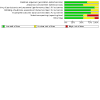
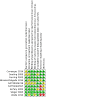

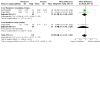
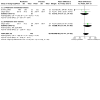
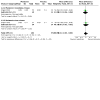
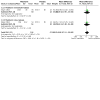
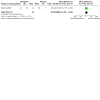
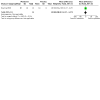

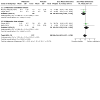
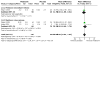
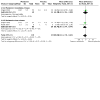
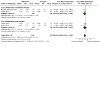
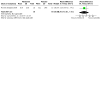
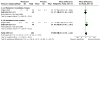
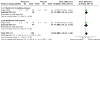
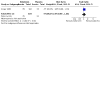
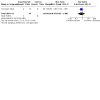
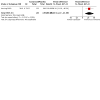

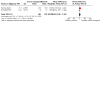
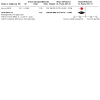
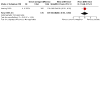

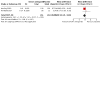
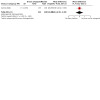
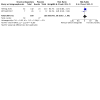
Update of
-
Pharmacotherapies for sleep disturbances in dementia.Cochrane Database Syst Rev. 2016 Nov 16;11(11):CD009178. doi: 10.1002/14651858.CD009178.pub3. Cochrane Database Syst Rev. 2016. Update in: Cochrane Database Syst Rev. 2020 Nov 15;11:CD009178. doi: 10.1002/14651858.CD009178.pub4. PMID: 27851868 Free PMC article. Updated.
References
References to studies included in this review
Camargos 2014 {published data only}
-
- Camargos EF, Louzada LL, Quintas JL, Naves JOS, Louzada FM, Nobrega OT. Trazodone improves sleep parameters in Alzheimer disease patients: a randomized, double-blind and placebo-controlled study. American Journal of Geriatric Psychiatry 2014;22(12):1565-74. [DOI: 10.1016/j.jagp.2013.12.174] - DOI - PubMed
-
- Camargos EF, Quintas JL, Louzada LL, Naves JO, Furioso AC, Nobrega OT. Trazodone and cognitive performance in Alzheimer disease. Journal of Clinical Psychopharmacology 2015;35(1):88-9. - PubMed
Dowling 2008 {published data only}
Herring 2020 {published data only}
-
- Herring WJ, Ceesay P, Snyder E, Bliwise D, Budd K, Hutzelmann J, et al. Clinical polysomnography trial of suvorexant for treating insomnia in Alzheimer's disease: trial design and baseline characteristics of participants. Journal of Prevention of Alzheimer's Disease 2018;5(1):S195.
Morales‐Delgado 2018 {published data only}
-
- Morales-Delgado R, Camara-Lemarroy CR, Salina-Martinez R, Gamez-Trevino D, Arredondo-Jaime A, Hernandez-Maldonado E, et al. A randomized placebo-controlled trial evaluating the effect of melatonin on sleep quality in patients with mild-moderate dementia. European Geriatric Medicine 2018;9(4):449-54. - PubMed
NCT00325728 {published data only (unpublished sought but not used)}
-
- NCT00325728. A double-blind, randomized, placebo-controlled study of the efficacy, safety and tolerability of 8 week treatment of Rozerem 8 mg (QHS) in sleep disturbed, mild to moderately severe Alzheimer's disease subjects. clinicaltrials.gov/ct2/show/NCT00325728 (first received 15 May 2006).
-
- NCT00325728. Clinical Trial Synopsis 01-05-TL-375-061, NCT#00325728: A double-blind, randomized, placebo-controlled study of the efficacy, safety and tolerability of 8 week treatment of Rozerem 8 mg (QHS) in sleep disturbed, mild to moderately severe Alzheimer's disease subjects. www.takeda.com/research/ct/pdf/report/15_Ramelteon_01-05-TL-375-061_Clin....
NCT03001557 {published data only}
-
- NCT03001557. Study of lemborexant for irregular sleep-wake rhythm disorder in mild to moderate Alzheimer's disease dementia. clinicaltrials.gov/ct2/show/NCT03001557 (first received 23 December 2016).
-
- Thein SG, Bsharat M, Kemethofer M, Filippov G, Kubota N, Moline M. Response to treatment with lemborexant: subjects with irregular sleep-wake rhythm disorder and Alzheimer's disease dementia. Alzheimer's & Dementia 2019;15 (7 Suppl):187.
Serfaty 2002 {published data only}
-
- Serfaty M, Kennell-Webb S, Warner J, Blizard R, Raven P. Double blind randomised placebo controlled trial of low dose melatonin for sleep disorders in dementia. International Journal of Geriatric Psychiatry 2002;17(12):1120-7. - PubMed
Singer 2003 {published data only}
Wade 2014 {published data only}
-
- Wade AG, Farmer M, Harari H, Fund N, Laudon M, Nir T, et al. Add-on prolonged-release melatonin for cognitive function and sleep in mild to moderate Alzheimer's disease: a 6-month, randomized, placebo-controlled, multicenter trial. Clinical Interventions in Aging 2014;9:947-61. [DOI: 10.2147/CIA.S65625. eCollection 2014] - PMC - PubMed
References to studies excluded from this review
Asano 2013 {published data only}
Asayama 2003 {published data only}
-
- Asayama K, Yamadera H, Ito T, Suzuki H, Kudo Y, Endo S. Double blind study of melatonin effects on the sleep-wake rhythm, cognitive and non-cognitive functions in Alzheimer type dementia. Journal of Nippon Medical School 2003;70:334-41. - PubMed
Bergener 1968 {published data only}
-
- Bergener M, Undeutsch D. Methods and problems of clinical psychopharmacology. Results of a double blind study with Medazepam and placebo in geriatric psychiatry. Arzneimittel-Forschung 1968;18:1563-6. - PubMed
Bergonzi 1973 {published data only}
-
- Bergonzi P, Capocchi G, Chiurulla C, Mennuni G, Tempsta E. Tryptophan and sleep in subjects with neuropsychiatric syndromes. Rivista di Neurologia 1973;43:403-9. - PubMed
Blytt 2018 {published data only}
Cardinali 2014 {published data only}
Cohen‐Mansfield 2000 {published data only}
-
- Cohen-Mansfield J, Garfinkel D, Lipson S. Melatonin for treatment of sundowning in elderly persons with dementia – a preliminary study. Archives of Gerontology and Geriatrics 2000;31:65-76. - PubMed
Cruz‐Aguilar 2013 {published data only}
-
- Cruz-Aguilar MA, Ramirez-Salado I, Cruz-Ulloa C, Benitez-King G. Melatonin effects on macro sleep architecture in Alzheimer's disease patients. Salud Mental 2013;36:243-9.
Eeles 2003 {published data only}
-
- Eeles E. The effect of melatonin on sleep pattern and levels of agitation in patients with dementia. National Research Register 2003.
Gehrmann 2009 {published data only}
-
- Gehrmann PR, Donald JC, Martin JL, Shochat T, Corey-Bloom J, Ancoli-Israel S. Melatonin fails to improve sleep or agitation in a double-blind randomized placebo-controlled trial of institutionalized patients with Alzheimer's disease. American Journal of Geriatric Psychiatry 2009;17(2):166-9. - PMC - PubMed
Gillman 1997 {published data only}
-
- Gillman PK. Tacrine for treatment of sleep disturbance in dementia. Journal of the American Geriatrics Society 1997;45:1286. - PubMed
Ginsburg 1976 {published data only}
-
- Ginsburg R, Weintraub M. Caffeine in the 'Sundown syndrome'. Report of negative results. Journal of Gerontology 1976;31:419-20. - PubMed
Hamuro 2018 {published data only}
-
- Hamuro A, Honda M, Wakaura Y. Suvorexant for the treatment of insomnia in patients with Alzheimer's disease. Australian & New Zealand Journal of Psychiatry 2018;52(2):207-8. - PubMed
Haworth 2001 {published data only (unpublished sought but not used)}
-
- Haworth J. A pilot, double-blind, placebo controlled, parallel group study of the effect of melatonin treatment in patients with Alzheimer's disease and sleep. National Research Register Archive 2001.
Howcroft 2005 {published data only}
-
- Howcroft DJ, Jones RW. Does modafinil have the potential to improve disrupted sleep patterns in patients with dementia? International Journal of Geriatric Psychiatry 2005;20:492-5. - PubMed
Kittur 1999 {published data only}
-
- Kittur S, Hause P. Improvement of sleep and behavior by methylphenidate in Alzheimer's disease. American Journal of Psychiatry 1999;156:1116-7. - PubMed
Linnoila 1980a {published data only}
-
- Linnoila M, Viukari M, Numminen A, Auvinen J. Efficacy and side effects of chloral hydrate and tryptophan as sleeping aids in psychogeriatric patients. International Pharmacopsychiatry 1980;15:124-8. - PubMed
Linnoila 1980b {published data only}
-
- Linnoila M, Viukari M, Lamminsivu U, Auvinen J. Efficacy and side effects of lorazepam, oxazepam, and temazepam as sleeping aids in psychogeriatric in-patients. International Pharmacopsychiatry 1980;15:129-35. - PubMed
Magnus 1978 {published data only}
-
- Magnus RV. A controlled trial of chlormethiazole in the management of symptoms of the organic dementias in the elderly. Clinical Therapeutics 1978;1(6):387-96.
Mahlberg 2004 {published data only}
-
- Mahlberg R, Kunz D, Sutej I, Kuhl KP, Hellweg R. Melatonin treatment of day-night rhythm disturbances and sundowning in Alzheimer disease: an open-label pilot study using actigraphy. Journal of Clinical Psychopharmacology 2004;24:456-9. - PubMed
Markowitz 2003 {published data only}
-
- Markowitz JS, Gutterman EM, Lilienfeld S, Papadopoulos G. Sleep-related outcomes in persons with mild to moderate Alzheimer disease in a placebo-controlled trial of galantamine. Sleep 2003;26:602-6. - PubMed
Meguro 2004 {published data only}
-
- Meguro K, Meguro M, Tanaka Y, Akanuma K, Yamaguchi K, Itoh M. Risperidone is effective for wandering and disturbed sleep/wake patterns in Alzheimer's disease. Journal of Geriatric Psychiatry and Neurology 2004;17:61-7. - PubMed
Mishima 1992 {published data only}
-
- Mishima K, Okawa M, Hishikawa Y. Effect of methylcobalamin (VB12) injection on sleep-wake rhythm in demented patients. Japanese Journal of Psychiatry & Neurology 1992;46:227-8. - PubMed
Moraes 2003 {published data only}
-
- Moraes WA, Poyares DL, Ramos LR, Bertolucci PH, Tufik S. Six-month donepezil treatment alters REM sleep parameters in Alzheimer's disease patients: a double-blind placebo controlled study. Sleep 2003;26:A351. - PubMed
Moraes 2006 {published data only}
-
- Moraes WA, Poyares DR, Guilleminault C, Ramos LR, Ferreira Bertolucci PH, Tufik S. The effect of donepezil on sleep and REM sleep EEG in patients with Alzheimer disease: a double-blind placebo-controlled study. Sleep 2006;29:199-205. - PubMed
NCT00035204 {published data only}
-
- NCT00035204. A study of the effects on sleep, attention, and gastrointestinal tolerance of galantamine and donepezil in patients with Alzheimer's disease. clinicaltrials.gov/show/NCT00035204 (first received 2 May 2002).
NCT00232570 {published data only}
-
- NCT00232570. Quetiapine for the treatment of insomnia in Alzheimer's disease. clinicaltrials.gov/show/NCT00232570 (first received 4 October 2005).
NCT00480870 {published data only}
-
- NCT00480870. The effect of anticholinesterase drugs on sleep in Alzheimer's disease patients. clinicaltrials.gov/show/NCT00480870 (first received 30 May 2007).
NCT00626210 {published data only}
-
- NCT00626210. Modafinil treatment for sleep/wake disturbances in older adults. clinicaltrials.gov/show/NCT00626210 (first received 20 February 2008).
NCT00706186 {published data only}
-
- NCT00706186. Safety and feasibility of sodium oxybate in mild Alzheimer's disease patients. clinicaltrials.gov/show/NCT00706186 (first received 24 June 2008).
NCT00940589 {published data only}
-
- NCT00940589. Efficacy of Circadin® 2 mg in patients with mild to moderate Alzheimer disease treated with AChE inhibitor. clinicaltrials.gov/show/NCT00940589 (first received 15 July 2009).
NCT01548287 {published data only}
-
- NCT01548287. A study of the safety and tolerability of AZD5213 effect on sleep for patients with Alzheimer's/cognitive impairment. clinicaltrials.gov/show/NCT01548287 (first received 5 March 2012).
NCT02258152 {published data only}
-
- NCT02258152. SYN120 study to evaluate its safety, tolerability and efficacy in Parkinson's disease dementia (SYNAPSE). clinicaltrials.gov/ct2/show/study/NCT02258152 (first received 7 October 2014).
Petit 1993 {published data only}
-
- Petit G, Montplaisir J, Lorrain D, Gauthier S. THA does not affect sleep or EEG spectral power in Alzheimer's disease. Biological Psychiatry 1993;33:753-4. - PubMed
Riemersma‐van der Lek 2008 {published data only}
-
- Riemersma-van der Lek RF, Swaab DF, Twisk J, Hol EM, Hoogendijk WJ, Van Someren EJ. Effect of bright light and melatonin on cognitive and noncognitive function in elderly residents of group care facilities: a randomized controlled trial. JAMA 2008;299:2642-55. - PubMed
Riley McCarten 1995 {published data only}
-
- Riley McCarten J, Kovera C, Maddox MK, Cleary JP. Triazolam in Alzheimer's disease: pilot study on sleep and memory effects. Pharmacology, Biochemistry and Behavior 1995;52:447-52. - PubMed
Ruths 2004 {published data only}
-
- Ruths S, Straand J, Nygaard HA, Bjorvatn B, Pallesen S. Effect of antipsychotic withdrawal on behavior and sleep/wake activity in nursing home residents with dementia: a randomized, placebo-controlled, double-blinded study. Journal of the American Geriatrics Society 2004;52:1737-43. - PubMed
Schubert 1984 {published data only}
-
- Schubert DS. Hydroxyzine for acute treatment of agitation and insomnia in organic mental disorder. Psychiatric Journal of the University of Ottawa 1984;9:59-60. - PubMed
Scoralick 2017 {published data only}
Scripnikov 2007 {published data only}
-
- Scripnikov A, Khomenko A, Napryeyenko O. Effects of Ginkgo biloba extract EGb 761 on neuropsychiatric symptoms of dementia: findings from a randomised controlled trial. Wiener Medizinische Wochenschrift 2007;157:295-300. - PubMed
Shaw 1992 {published data only}
-
- Shaw SH, Curson H, Coquelin JP. A double-blind, comparative study of zolpidem and placebo in the treatment of insomnia in elderly psychiatric in-patients. Journal of International Medical Research 1992;20:150-61. - PubMed
Shinno 2008 {published data only}
-
- Shinno H, Inami Y, Inagaki T, Nakamura Y, Horiguchi J. Effect of Yi-Gan San on psychiatric symptoms and sleep structure at patients with behavioral and psychological symptoms of dementia. Progress in Neuro-Psychopharmacology & Biological Psychiatry 2008;32:881-5. - PubMed
Simon Padilla 2009 {published data only}
-
- Simon Padilla OJ, De Linares Del Rio C, Godden P, Granizo E, Pinilla M, Rodriguez C. Use of combined treatment with melatonin and clomethiazole in circadian rhythm sleep disorder in the elderly with dementia. Revista Espanola de Geriatria y Gerontologia 2009;44:233-4. - PubMed
Singer 2007 {published data only}
-
- Singer CM, Nanda F. Modafinil vs. placebo: effects on daytime sleep in Alzheimer's disease. Biological Psychiatry 2007;61:144S.
Stahl 2004 {published data only}
-
- Stahl SM, Markowitz JS, Papadopoulos G, Sadik K. Examination of nighttime sleep-related problems during double-blind, placebo-controlled trials of galantamine in patients with Alzheimer's disease. Current Medical Research and Opinion 2004;20:517-25. - PubMed
Stemmelin 2013 {published data only}
-
- Stemmelin J, Kirkesseli S, Martincova R, Bejuit R, Corp-Dit-Genti V, Morrison G, et al. A phase 2 study to investigate the effects of Sar110894 on cognition, daily function, apathy and sleep in mild to moderate Alzheimer's disease patients. Journal of Nutrition, Health and Aging 2013:804-5.
Tozawa 1998 {published data only (unpublished sought but not used)}
-
- Tozawa T, Mishima K, Satoh K, Matsumoto Y, Echizenya M, Sasaki M, et al. Melatonin replacement therapy for rest-activity rhythm disorders in patients with senile dementia of Alzheimer's type. In: 21st Collegium Internationale Neuropsychopharmacologium (CINP) Congress; 1998 Jul 12-16; Glasgow, Scotland. 1998.
UMIN000006251 {published data only}
-
- UMIN000006251. Study of the influences of Yokukansan for sleep disturbance in dementia. wwwwhoint/trialsearch/Trial2aspx?TrialID=JPRN-UMIN000006251 (first received 01 August 2011).
UMIN000006388 {published data only}
-
- UMIN000006388. Investigation on the effects of memantine on psychiatric symptoms and sleep disturbances in patients with Alzheimer's disease. upload.umin.ac.jp/cgi-open-bin/ctr_e/ctr_view.cgi?recptno=R000007581 (first received 21 September 2011).
UMIN000016374 {published data only}
-
- UMIN000016374. The controlled study of medical treatment for the sleep disturbance in dementia. upload.umin.ac.jp/cgi-open-bin/ctr_e/ctr_view.cgi?recptno=R000019016 (first received 29 January 2015).
UMIN000022860 {published data only}
-
- UMIN000022860. Evaluation of cognitive, affective, olfactory functions and sleep disturbance improvement in dementia with Lewy bodies patients treated with galantamine. wwwwhoint/trialsearch/Trial2aspx?TrialID=JPRN-UMIN000022860 (first received 23 June 2016).
Valtonen 2005 {published data only}
-
- Valtonen M, Niskanen L, Kangas A-P, Koskinen T. Effects of melatonin-rich night-time milk on sleep and activity in elderly institutionalized subjects. Nordic Journal of Psychiatry 2005;59:217-21. - PubMed
Walther 2011 {published data only}
-
- Walther S, Shüpbach B, Seifritz E, Strik W. Randomized, controlled, crossover trial of dronabinol, 2.5mg, for agitation in 2 patients with dementia. Journal of Clinical Psychopharmacology 2011;31(2):254-6. - PubMed
Yehuda 1996 {published data only}
-
- Yehuda S, Rabinovtz S, Carasso RL, Mostofsky DI. Essential fatty acids preparation (sr-3) improves Alzheimer's patients quality of life. International Journal of Neuroscience 1996;87:141-9. - PubMed
References to studies awaiting assessment
KCT0002521 {published data only}
-
- KCT0002521. Clinical study on safety and effectiveness of Ukgansan ga jinpibanha for insomnia: safety and effectiveness (a randomized controlled, double-blind, parallel study, pilot study). cris.nih.go.kr/cris/en/search/search_result_st01.jsp?seq=10276 (first received 27 April 2017). [Protocol ID CIMI-16-01-05 ]
NCT00814502 {published data only}
-
- NCT00814502. Zolpidem CR and hospitalized patients with dementia. clinicaltrials.gov/ct2/show/NCT00814502 (first received 25 December 2008).
References to ongoing studies
NCT02708186 {published data only}
-
- NCT02708186. Study evaluating nelotanserin for treatment of REM sleep behavior disorder in subjects with dementia (DLB or PDD). clinicaltrials.gov/ct2/show/NCT02708186 (first received 15 March 2016).
NCT03075241 {published data only}
-
- NCT03075241. Z-drugs for sleep disorders in Alzheimer's disease. clinicaltrials.gov/ct2/show/NCT03075241 (first received 9 March 2017).
NCT03082755 {published data only}
-
- NCT03082755. Nighttime agitation and restless legs syndrome in people with Alzheimer's disease. clinicaltrials.gov/ct2/show/NCT03082755 (first received 17 March 2017).
Additional references
Afram 2014
Ancoli‐Israel 1997
Bliwise 2011
Borbély 2016
Buxton 2000
-
- Buxton OM, Copinschi G, Van Onderbergen A, Karrison TG, Van Cauter E. A benzodiazepine hypnotic facilitates adaptation of circadian rhythms and sleep-wake homeostasis to an eight hour delay shift simulating westward jet lag. Sleep 2000;23:915-27. - PubMed
Camargos 2013
-
- Camargos EF, Louzarda FM, Nobrega OT. Wrist actigraphy for measuring sleep in intervention studies with Alzheimer's disease patients: application, usefulness and challenges. Sleep Medicine Reviews 2013;17:475-88. - PubMed
Cardinali 2010
Closser 1991
-
- Closser MH. Benzodiazepines and the elderly: a review of potential problems. Journal of Substance Abuse Treatment 1991;8:35-41. - PubMed
Coupland 2011
-
- Coupland CA, Dhiman P, Barton G, Morriss R, Arthur A, Sach T, et al. A study of the safety and harms of antidepressant drugs for older people: a cohort study using a large primary care database. Health Technology Assessment 2011;15(28):1-202. - PubMed
Cumming 2003
-
- Cumming RG, Le Couteur DG. Benzodiazepines and risk of hip fractures in older people: a review of the evidence. CNS Drugs 2003;17:825-37. - PubMed
Donaldson 1998
-
- Donaldson C, Tarrier N, Burns A. Determinants of carer stress in Alzheimer's disease. International Journal of Geriatric Psychiatry 1998;13:248-56. - PubMed
Fuh 2005
Gao 2009
-
- Gao QW, Liu Y, Luo GQ, Xiang W, Peng KR. Effect of melatonin on mild Alzheimer's disease in elderly male patients. Practical Geriatrics 2009;23(1):56-8.
Gaugler 2000
-
- Gaugler JE, Edwards AB, Femia EE, Zarit SH, Parris Stevens M-A, Townsend A, et al. Predictors of institutionalization of cognitively impaired elders: family help and the timing of placement. Journals of Gerontology. Series B, Psychological Sciences and Social Sciences 2000;55:247-55. - PubMed
Gehrman 2018
Goodman 2017
Guarnieri 2012
-
- Guarnieri B, Adorni F, Musicco M, Appollonio I, Bonanni E, Caffarra P, et al. Prevalence of sleep disturbances in mild cognitive impairment and dementing disorders: a multicenter Italian cross-sectional study on 431 patients. Dementia & Geriatric Cognitive Disorders 2012;33(1):50-8. [DOI: 10.1159/000335363] - DOI - PMC - PubMed
Guyatt 2011
-
- Guyatt G, Oxman AD, Akl EA, Kunz R, Vist G, Brozek J, et al. GRADE guidelines: 1. Introduction – GRADE evidence profiles and summary of findings tables. Journal of Clinical Epidemiology 2011;64:383-94. - PubMed
Hart 2003
-
- Hart DJ, Craig D, Compton SA, Critchlow S, Kerrigan B, McIlroy SP, et al. A retrospective study of the behavioural and psychological symptoms of mid and late phase Alzheimer's disease. International Journal of Geriatric Psychiatry 2003;18(11):1037-42. - PubMed
Herring 2017
Higgins 2011
-
- Higgins JP, Altman DG, Sterne JA. Chapter 8: Assessing risk of bias in included studies. In: Cochrane Handbook for Systematic Reviews of Interventions 5.1.0 (updated March 2011). The Cochrane Collaboration, 2011. Available from handbook.cochrane.org.
Howard 2011
-
- Howard R, Phillips P, Johnson T, O'Brien J, Sheehan B, Lindesay J, et al. Determining the minimum clinically important differences for outcomes in the DOMINO trial. International Journal of Geriatric Psychiatry 2011;26(8):812-7. - PubMed
Li 2019
-
- Li P, Fan W, Yu L, Lim AS, Buchman AS, Bennett DA, et al. Interaction between the progression of Alzheimer's dementia and circadian disturbances: a 13-year longitudinal study in community-based older adults. Sleep 2019;42(S1):A123. [DOI: 10.1093/sleep/zsz067.300] - DOI
Liguori 2014
Lyketsos 2000
Mishima 2000
-
- Mishima K, Okawa M, Hozumi S, Hishikawa Y. Supplementary administration of artificial bright light and melatonin as potent treatment for disorganized circadian rest-activity and dysfunctional autonomic and neuroendocrine systems in institutionalized demented elderly persons. Chronobiology International 2000;17(3):419-32. - PubMed
NICE 2018
-
- National Institute for Health and Care Excellence. Dementia: assessment, management and support for people living with dementia and their carers. www.nice.org.uk/guidance/ng97 (accessed prior to 5 November 2020). - PubMed
Oderda 2012
-
- Oderda LH, Young JR, Asche CV, Pepper GA. Psychotropic-related hip fractures: meta-analysis of first-generation and second-generation antidepressant and antipsychotic drugs. Annals of Pharmacotherapy 2012;46:917-28. - PubMed
Papillon‐Ferland 2019
Rongve 2010
-
- Rongve A, Boeve BF, Aarsland D. Frequency and correlates of caregiver-reported sleep disturbances in a sample of persons with early dementia. Journal of the American Geriatrics Society 2010;58(3):480-6. - PubMed
Schneider 2005
Schneider 2006
Van Egroo 2019
Wilfling 2015
References to other published versions of this review
McCleery 2014
Publication types
MeSH terms
Substances
Associated data
LinkOut - more resources
Full Text Sources
Medical

